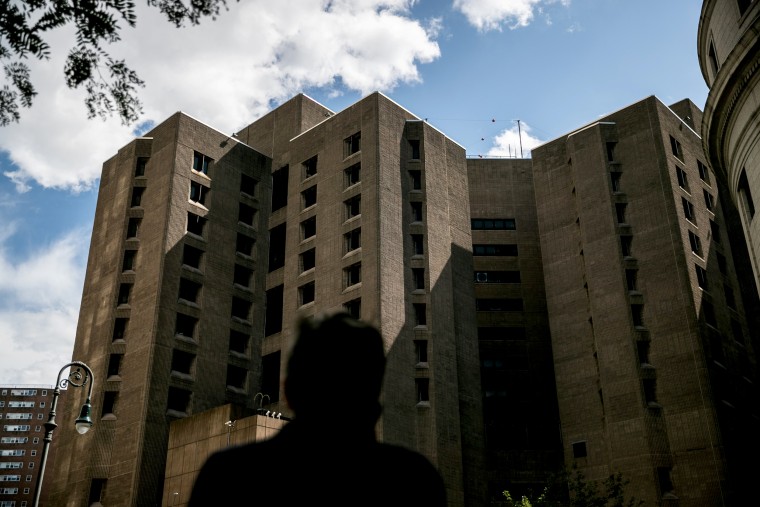An inmate locked up a few cells away from Jeffrey Epstein heard nothing out of the ordinary the morning of his death, according to the man's lawyer.
"Nobody heard anything," said Bruce Barket, who represents Nicholas Tartaglione, a former upstate New York police officer awaiting trial on murder charges.
"It was a silent act."
Epstein, 66, was found unresponsive in his cell at the Metropolitan Correctional Facility in New York City about 6:30 a.m. Aug. 10.
The wealthy financier and accused sex trafficker appeared to have hanged himself, according to multiple law enforcement officials. The chief medical examiner has yet to release a determination on a cause of death but all signs point to suicide, people briefed on the case have told NBC News.
The incident came roughly three weeks after Epstein was found unconscious in his cell, with marks around his neck, in what authorities were investigating as a suicide attempt.
Tartaglione was inside the cell with Epstein at the time of the first incident, his lawyer said, and not far away in the facility's special housing unit when Epstein apparently succeeded in taking his life.
"Nick knows a heck of a lot about what went on," Barket said. "He was there during the first attempt and he was there when he actually killed himself — he just wasn't in the same cell."
The FBI and the Justice Department Inspector General have launched investigations into Epstein's death. But Tartaglione has not yet been contacted by investigators, Barket said.
A former police officer in Briarcliff Manor, New York, Tartaglione, 51, is facing the death penalty if convicted on charges of killing four men and burying them in his yard in 2016. Prosecutors allege that the former officer was involved in a cocaine distribution conspiracy.
"Whether or not he'll be in a position to cooperate remains unclear," his lawyer said. "But he certainly has information that would be very valuable to the investigation if they want access to it."
Epstein's death has prompted mounting criticism of the federal jail system and the Justice Department, which is responsible for overseeing it.
Epstein was placed under suicide watch after the incident last month, a protocol that called for him to be moved to a cell stripped of bedsheets, placed in special clothing and monitored more closely, according to multiple officials.
But he was pulled off suicide watch a week or so later, and returned to a cell in the special housing unit, officials say. He was supposed to be checked every 30 minutes but a period of hours passed with no checks on the morning of Aug. 10, officials told NBC News.
Barket, who has been to the facility dozens of times in recent months, said it's a grueling and dehumanizing place for inmates, plagued by poor ventilation, faulty plumbing and rodent and insect infestations.
The conditions at the Metropolitan Correctional Center, also known as the MCC, have drawn numerous complaints from inmates over the years. Just last month, the notorious drug lord Joaquin "El Chapo" Guzman described his stint in a more restrictive unit than Epstein's as "physical, emotional and mental torture."
"None of us are surprised this happened," Barket said. "This is a result of the whole nature of the way this place is run — a bad combination of cruel and lazy."
In an interview with NBC News, one of Epstein's lawyers, Marc Fernich, described the MCC as a "barbaric place" to keep people who have yet to be found guilty of a crime.
"Almost anybody would prefer to be in their permanent designation facility than locked up there under really inhumane conditions that can break a person's soul and crush their spirit," Fernich said.
Fernich declined to go into specifics about Epstein's mental state or the conditions he was living in, but he lamented what he described as an absence of educational programs, as well as poor food and limited if any recreational time.
"Prosecutors and judges and other stakeholders in the justice system know with a wink and a nod that if you're subjected to those onerous conditions, the likelihood of a plea or worse, as happened here, is exponentially increased," Fernich said.
"When something like this happens, nobody feels sorry for these people and I'm not asking them to," Fernich said. "But this is a dark stain on the justice system in our country."

